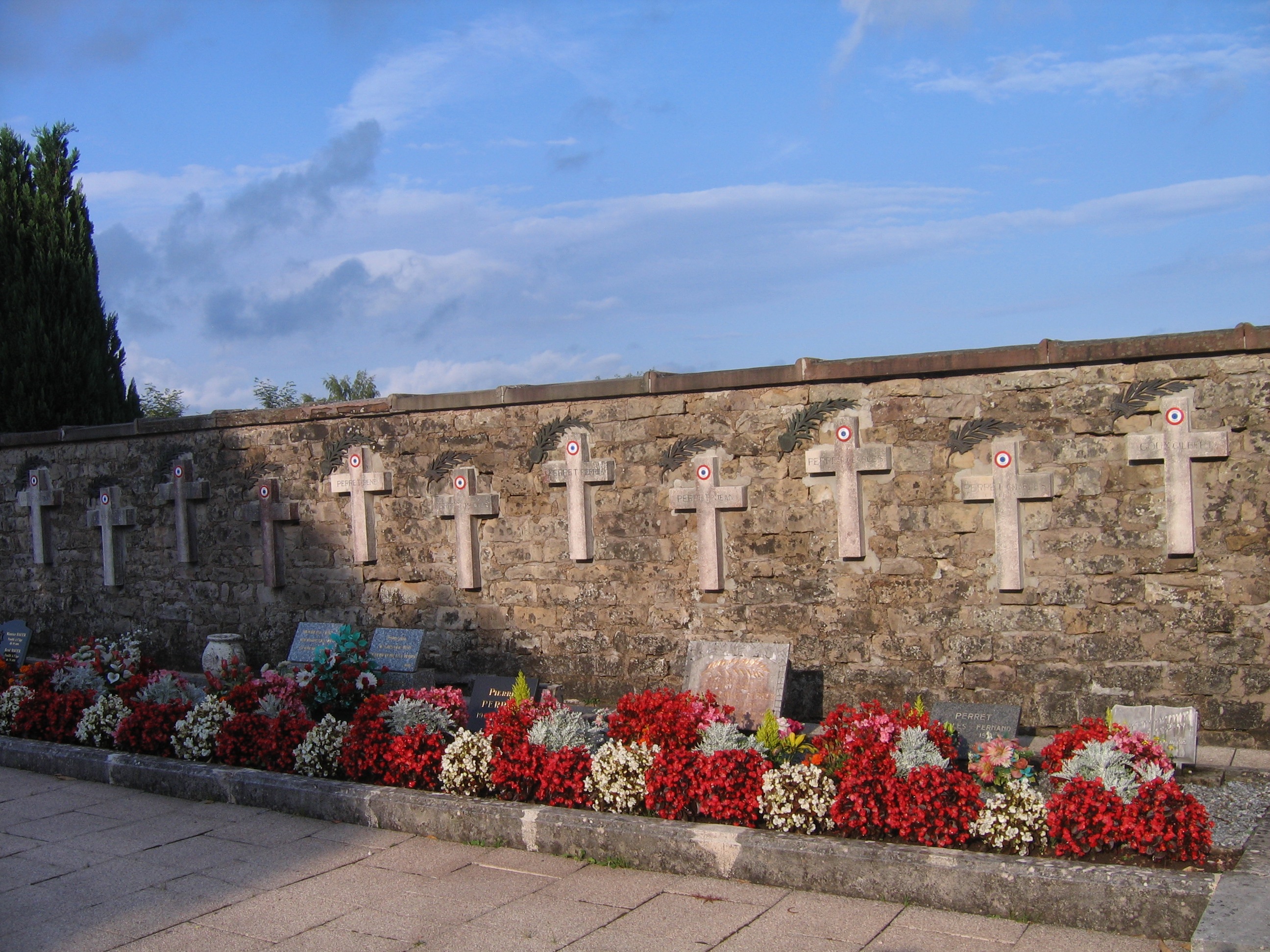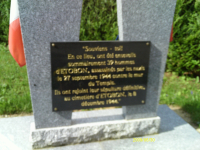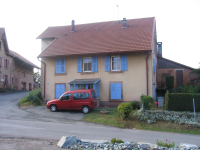Massacre
By October 1, the families remaining in Etobon learned the fate of their men. Jules Perret writes:
Sunday, October 1
As soon as we woke up, we wondered if it was all just a nightmare. We simply could not believe this tragedy. And still … Somber Sunday, torn up by the shelling. My sister went to Chenebier. A hard pilgrimage. She brought back horrific details.
They locked them in the factory. Several were beaten, the mayor slapped. It was Karl Lade, one of our escaped prisoners, who chose the twenty-three victims to add to the seventeen suspects, because they wanted forty from Etobon, no matter how they were selected. The order was given by Colonel Vonalt, Major Bachmayer and Dr. Rudy Rauch of Frédéric-Fontaine, where these assassins were from. Lade had stopped at 37, but the commanding officer had sent him back to choose three more from among the captives. Forty! They had to have forty! And he chose Robert Goux, my brother-in-law Alfred Pochard and his son Samuel. The list finally complete, they made the 27 non-condemned leave. Two horse-drawn wagons were ready, and they were taken off in the direction of Belfort. (Of those, ten days later, at Banvillars, they killed three more of ours, A. Nardin, M. Nardin, P. Goux and four of the gendarmes taken from Etobon.)
The wagons gone, the officer told the others they would be shot. What were the last thoughts of these poor men? To see themselves butchered like animals in a slaughterhouse! And so it began. The villagers saw it all from their windows. Jacques and his uncle Alfred embraced each other. They went to their deaths in groups of ten. Mayor Charles Suzette went first, his cap in his hand. René was second. It was the Cossack devil Pietro-Pilot, the Sicilian runt, who asked to be the executioner.
From one window, Manuel Abry’s wife said to Maurice Bauer, her nephew, “Oh, you too, Maurice!” He responded, “Of course.” She saw her other nephew, René Bauer pass by, too. The Italian monster shot them with a machine gun, and an SS used a rifle. At his last moment, Maurice knelt down on his brother’s body. One group sang the Marseillaise, so loudly that they were heard all the way to le Haut des Evaux. Their voices went silent as they fell. Poor little Georges Perret, seventeen years old, fixed a look of infinite distress on Mme. Abry … Pierre Nardin, nineteen years old, couldn’t move another step and his brother Jean took him in his arms and brought him to face his executioner. André Large, eighteen years old, cried out “Dirty boches!” Fernand Goux, who had four children, pleaded with the monsters to spare him. Seeing that his pleas were getting nowhere, cried out, “Cowards!” The Italian was only too happy to kill. The SS was glad to shoot those who were still moaning. Poor Christ Guemann, such a strong man, wouldn’t die. The SS shot him several times. And Robert Goux, the giant who didn’t have an ounce of meanness in him.
The villains! Taking the lives of forty men in cold blood, for vengeance. Miserable cowards, who massacred so many civilians, so many hostages, guilty only of loving their country and defending it, you want to make war, and what a war, but you don’t want it turned on you! Our men, our children – you could have just locked them up, but no, you needed blood.
At Chenebier, my sister found her husband’s glasses. The frames were twisted, covered with dirt and blood. The Cossacks stole everything these poor men had. It wasn’t an accident the Germans had said, “give them food.” Mama had given Jacques four spice cakes. They must have had a feast.
And now, for us, life must go on. But a black veil has been spread in front of our eyes.
We spent last night in Albert’s cellar. A quiet night. We slept a little. I heard a lot of sobs. I thought about a lot of things, about these words that my brother-in-law said, “What are we doing here on earth. After all, I think I’d prefer they’d just shoot me …” And, in my minds’ eye, I see Etobon in happy times. Poor little village in the woods! To have so many beautiful young men! Now they’re all dead. We’ll never again have those joyous celebrations in the parish hall … They’ll never play “Black Feather” or “The Little Dwarves of the Mountain” again. I remember the photos taken on those happy occasions, these young men painted up like savages, standing next to the missionary tied to the cooking pot in front of the council fireplace. All these children, so happy to be alive, shot, all except Fernand Perret (he died in Dachau, in January 1945, along with Raymond Nardin, brother of Pierre and Jean. What a nightmare.)

 Katherine Douglass
Katherine Douglass
